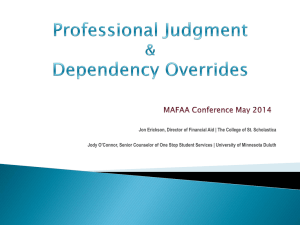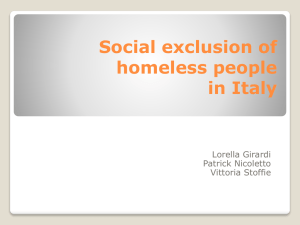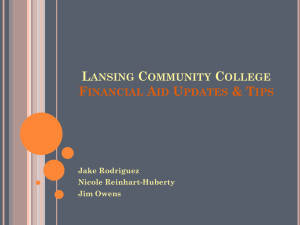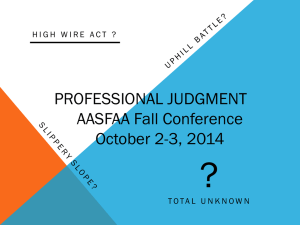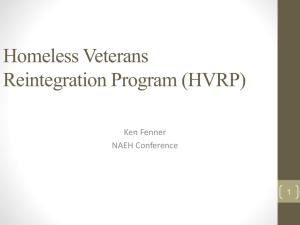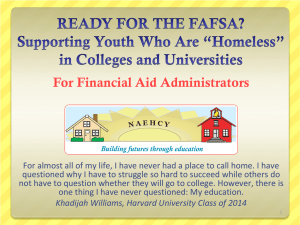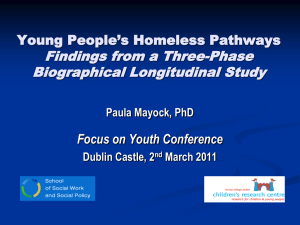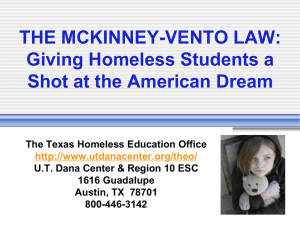Identifying and Assisting Homeless Students
advertisement
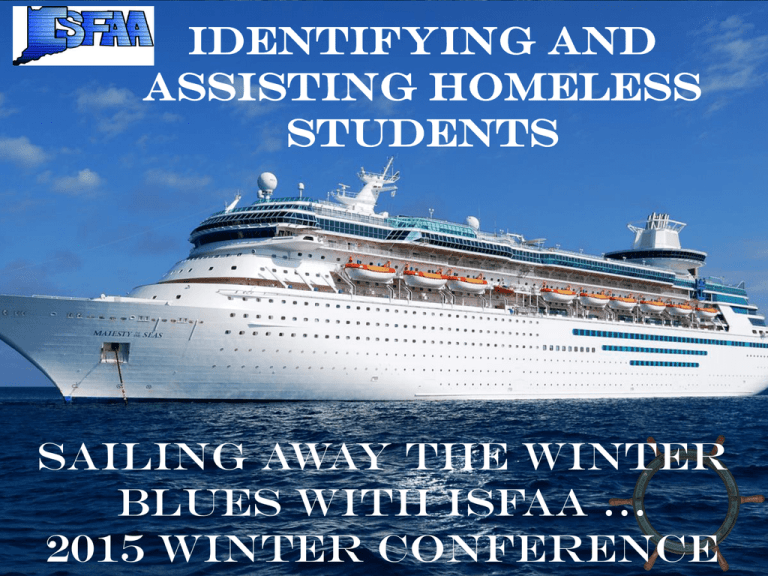
Identifying and Assisting Homeless Students Sailing away the winter blues with ISFAA … 2015 Winter Conference Today’s Goals After today’s presentation, we hope you will: o o o o Know where to locate state and local homeless liaisons Know where to locate online resources Understand the relevant definitions Understand the regulations in relationship to identifying homeless/at risk students o Understand the regulations in relationship to simplifying the determination process for the student o Appreciate the importance of providing services for these students 2012 -2014 Statistics (National Center for Homeless Education) 15,777 homeless children (enrolled in public school) living in Indiana 1,258,182 homeless children in the U.S. Approximately 58,000 homeless attending college The McKinney-Vento Act The McKinney-Vento Act (1987) o Federal education law (NCLB Title X, Part C 2001) o Designed to ensure school access and promote school success for children and youth who are considered “homeless”. Every school district must designate a McKinney-Vento (MV) District Liaison. o The key to McKinney-Vento Act implementation. o Ensures identification, enrollment, transportation, services, dispute resolution, and awareness. Every state must designate an MV State Liaison o Ms. Julie Smart, Interim Contact, IN Dept of Ed Financial Aid Implications The College Cost Reduction and Access Act (CCRAA 2007) expanded definition of independent student to include homeless student as defined by the McKinney-Vento Act A student is independent if at any time on or after July 1, 2013, he is determined to be: o An unaccompanied youth who is homeless, OR o An unaccompanied youth who is self-supporting and at risk of being homeless Determination is irrespective of if the student is CURRENTLY homeless or at risk FAFSA Questions 56 – At any time on or after July 1, 2013, did your high school or school district homeless liaison determine that you were an unaccompanied youth who was homeless or were self-supporting and at risk of being homeless? 57 – At any time on or after July 1, 2013, did the director of an emergency shelter or transitional housing program funded by the U.S. Department of Housing and Urban Development determine that you were an unaccompanied youth who was homeless or were self-supporting and at risk of being homeless? 58 – At any time on or after July 1, 2013, did the director of a runaway or homeless youth basic center or transitional living program determine that you were an unaccompanied youth who was homeless or was self-supporting and at risk of being homeless? Homeless Youth Definitions Homeless o Lacking fixed, regular and adequate housing o If student is living in this situation , fleeing an abusive parent, they may be considered homeless, even if the parent would provide support and a place to live o A youth can be homeless even if he CHOSE to leave home At risk of being homeless o Is the student’s housing likely to be cease being fixed, regular and adequate? o Is the student at risk of homelessness due to eviction or other housing loss? Self-supporting o Student is responsible for their living expenses, including fixed, regular and adequate housing Unaccompanied o Not in the physical company of a parent or guardian Youth o 21 years of age or younger OR o Still enrolled in high school as of the date the FAFSA is signed Housing Definitions Fixed o Stationary and permanent o Not likely to change Regular o Used on a predictable, consistent, or routine basis Adequate o Sufficient for meeting both the physical and psychological needs typically met in the home Examples of Homelessness Sharing the house of others Living in motels, hotels, or camping grounds Living in an emergency or transitional shelter Awaiting foster care placement Living in places not designed for humans to live Living in cars, parks, abandoned buildings, bus, or train stations Migratory children also qualify as homeless when living under these conditions Why is the Definition so broad? Shelters are often full, turning youth away There are no shelters in many suburban/rural areas Eligibility rules of shelters often exclude unaccompanied minors Youth may fear adult shelters Shelters often have 30-, 60-, or 90-day time limits Youth may be unaware of alternatives, fleeing in crisis, living in over-crowded, temporary, and sometimes unsafe environments Shelters often are a last resort after all other possibilities are exhausted What Causes Homelessness in Youth? Family dysfunction o o o o o Conflict with step-parents Conflict over youth’s sexual orientation Conflict over youth’s pregnancy Family violence Loss of parents (due to incarceration, illness or death) Forced separation o Lack of space in temporary accommodations o Shelter policies that prohibit adolescent boys o Family cannot afford to care for older youth Who Makes the Status Determination? Determination can be made by o School district homeless liaison o The director (or designee) of an emergency shelter or transitional housing program funded by HUD o Director (or designee) of a runaway or homeless youth basic center or transitional living program, OR o In the case of none of the above, the FAA must determine The FAA’s Role Do not further question the student if the homeless determination is made by one of the three authorized agencies: an MV liaison, Runaway and Homeless Youth Act (RHYA) provider, or Housing and Urban Development (HUD) provider. If you suspect the agency is wrong or the agency is abusing the system, contact the o School District Liaison, or o Director of an emergency shelter or transitional housing program, or o Director of a runaway or homeless youth basic center According to the AVG, if a student has not been determined to be homeless by one of the three authorized agencies, the FAA must make the determination of homeless/unaccompanied status. The FAA’s Role in Determination Determine status on a case-by-case basis Develop a checklist or interview form to ensure: o That students are treated fairly o Determinations are made on consistent criteria Documentation must include the FAA’s determination that the student meets the homeless definition (e.g., completed interview form with FAA notes) FAA may choose to collect 3rd party documentation (i.e. clergy, teacher, grandparent) FAA Determination of Homelessness/At Risk Create a process for determination that is sensitive to the unique needs of these youth. o Conduct the interview within the same day of the student’s college/university visits if at all possible. o Do not use the word “homeless” o Do not interview the youth in front of others. o If they do not have paperwork, work with them. o Let them use resources that may not be readily available to them, such as the computer, phone or fax machine. Sample Questions to Determine “Homelessness” Tell me about where you’re living. Is this a permanent or temporary arrangement? Are you looking for another place to live? Why are you staying in your current place? Where would you go if you couldn’t stay where you are? Are you staying with friends/relatives for just a little while? Could your friends/relatives ask you to leave, if they wanted to? Sample Questions for Determining “Unaccompanied” Youth Status Do you live with your parent/guardian? How often do you interact with your parents/guardians? Do your parents/guardians financially support you in any way? Do they pay any bills for you? How long have you been on your own? How long have you been supporting yourself? Verification of Homeless Status FAA is NOT required to collect documentation from an agency UNLESS there is conflicting information o If verification needed, a documented phone call, or a written statement from one of the authorized agency is sufficient If FAA makes the determination, documentation must: o Demonstrate that the student’s living arrangements meet the FAFSA definition o Include written documentation, when available o Determination may be based on a documented interview with the student if written documentation not available. Disagreeing with a designated agencies determination is not considered “conflicting information” Student’s Right to Contest Your Determination Make sure the student understands he can contest your decision Student can provide supporting documents to be reviewed collaboratively by: o School’s general counsel o Financial Aid Director, and o A recognized MV practitioner Student can also appeal to the Department FAFSA and ISIR Submission NOT a dependency override Like a dependency override, you can rely on a determination by another school CPS online or EDE: o Select Homeless Youth Determination (option 4) in dependency override field Paper FAFSA: o Fill in relevant bubble in the “College Use Only” box Students who don’t fit the definition of youth (older than 21/not yet 24), but, meet the homeless definition, are processed as a DO Case Studies Strategies for Colleges and Universities Work to identify unaccompanied homeless youth at your school. o Post information publicly in strategic locations throughout campus. o Posters are available on the NAEHCY Unaccompanied Youth Toolkits. o Create awareness of the issue among staff, particularly those working in the area of financial aid, admissions, recruitment, and support for lowincome students. Strategies for Colleges and Universities Help youth connect with on-campus support services. Establish a Single Point of Contact (SPOC) Refer unaccompanied students to student support services, tutors, counselors, etc. upon admission, including programs for students coming out of foster care (needs often are similar). Establish coordination between financial aid offices, student support services, and campus housing. Establish a food and clothing bank on campus. Establish a mentoring or peer program for unaccompanied homeless youth. Strategies for Colleges and Universities Give unaccompanied youth priority for on-campus jobs that provide housing, such as Resident Advisor or Dorm Monitor. Give unaccompanied youth priority for other on-campus jobs, such as work in the dining hall, bookstores or college tour guides. Plan housing for homeless students when dormitories close; ideas include leaving one residence hall open or establishing a list of “host homes” in the community. Give youth a list of contact addresses, websites and phone numbers for community services, and offer assistance in connecting with services such as health and mental health care and SNAP/Food Stamps. Recruiting Strategies Network with your State Homeless Coordinator and Homeless Education Liaisons in the school districts your institution typically recruits from. State coordinator can connect you with local school district homeless liaisons Train admission’s representatives Coordinate with Upward Bound and Trio Display posters on campus Reach out to shelters
